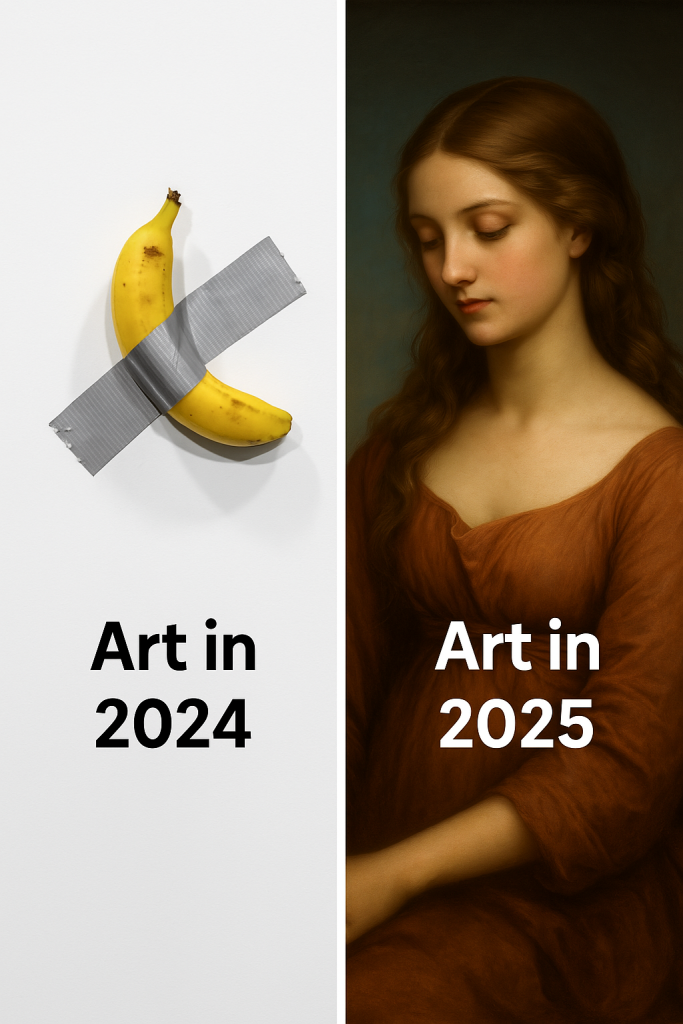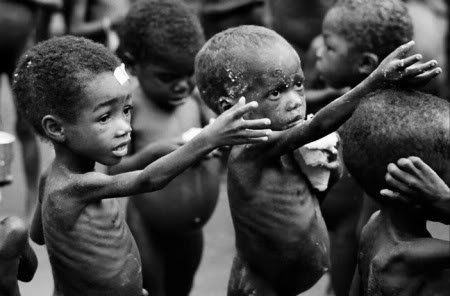By Sean Dempsey, 04/03/25
In hindsight, 2024 will likely be chronicled in history books as the year when the postmodern fever broke—an era marked by an unchecked commitment to relativism, the absurd elevation of subjectivity, and an almost religious rejection of objective truth. Beauty was no longer allowed to exist on its own terms; instead, it became a platform for ideological statements. When a woman suffering visibly from obesity was crowned as a symbol of “beauty” in Alabama, it wasn’t about empowerment—it was about reprogramming our sense of reality. At the same time, the art world continued its spiral into meaninglessness, with works like a banana taped to a wall selling for MILLIONS of dollars ($6.2M!)
These weren’t moments of aesthetic evolution—they were cultural breakdowns dressed in the borrowed robes of progressivism.

This was not limited to aesthetics. Postmodernism, in its final gasp, denied the sanctity of truth itself. Every narrative was said to be valid, every perspective unchallengeable, and every claim to objectivity dismissed as an instrument of oppression. Institutions once charged with maintaining intellectual and moral clarity instead indulged in an endless fragmentation of meaning. Science was questioned not on rational grounds but through ideological suspicion. Language itself was weaponized—not to clarify, but to obfuscate. The result? A cultural atmosphere thick with confusion and contradiction, where those who insisted on the existence of reality were branded as reactionaries. But the center could not hold.
By 2025, a tide had clearly turned. The public, fatigued by moral performance and aesthetic nihilism, seemed to collectively declare: the emperor has no clothes. A return to reality has begun—not a retreat into naïve modernism, but a bold movement into metamodernism. As theorists like Hanzi Freinacht, Timotheus Vermeulen, and Robin van den Akker suggest, metamodernism is not about discarding postmodern insights, but about integrating them into a new, upward trajectory. It is an oscillation—between sincerity and irony, between truth and complexity, between the ideal and the real. It holds space for subjective experience, but does not surrender objective truth on the altar of inclusion. In Freinacht’s terms, we are now entering a “political metamodernism,” where depth, empathy, and developmental thinking shape the future rather than the empty rituals of cultural guilt or irony.
What we’re witnessing is not a regression, but a synthesis. The crowning of Abbie Stockard as Miss America—a woman of classical beauty, achievement, and discipline—was not merely a return to the old ideals, but a reclamation of standards grounded in health, virtue, and truth. In the art world, the popularity of beauty, technique, and transcendence is rising again. Public appreciation is shifting toward works that evoke awe and meaning, not confusion or shock. Even in political culture, we’re seeing green shoots: longform public discourse is returning, citizens are questioning ideological extremes on both ends, and a new hunger for unity—not uniformity, but unity through complexity—is taking hold.
Other signs of progress abound. In education, there is renewed interest in teaching foundational knowledge, critical thinking, and civic virtue, reversing the postmodern drift into infinite relativism. In digital spaces, the backlash against algorithmic echo chambers and deepfake illusions has given rise to new platforms focused on dialogue, reflection, and truth-verification. Even fashion and design are responding—moving away from ironic ugliness and fast aesthetics toward timelessness, craftsmanship, and symbolic coherence. These are not coincidences. They are evidence of a society emerging from cultural adolescence and reaching for something higher.
We have crossed a cultural Rubicon. What lies ahead is not a return to rigid modernity, nor a relapse into ironic postmodernism, but a new era—an age of metamodern integration. We are rediscovering the sacred in truth, the meaningful in beauty, and the shared in the human. The future will not belong to those who weaponize language or deny reality for ideological points, but to those who build, bridge, and believe again—not in old myths, but in new, hard-earned coherence. The moment is critical. And finally, many of us are wide awake.


Ironically, I wrote a piece about the cresting wave of relativism on the same day absurdism runs rampant in the economic headspace of the common day Republican. They cheer today for tariffs of all things–a form of taxation which destroys the poor and middle class. A form of taxation which raises the cost of things for all Americans–all under the pretense of “getting back at others.” We cut off our nose to spite our face; we shoot our own people in the foot to even the playing field when China and Mexico shoot its citizens in the foot. It is irrationality and absurdism to the 10th degree. And it’s met with thunderous applause from the economically illiterate. Sigh 😮💨
Directions: write an article showing a lack of understanding of both ‘woke’ and ‘postmodernism.’